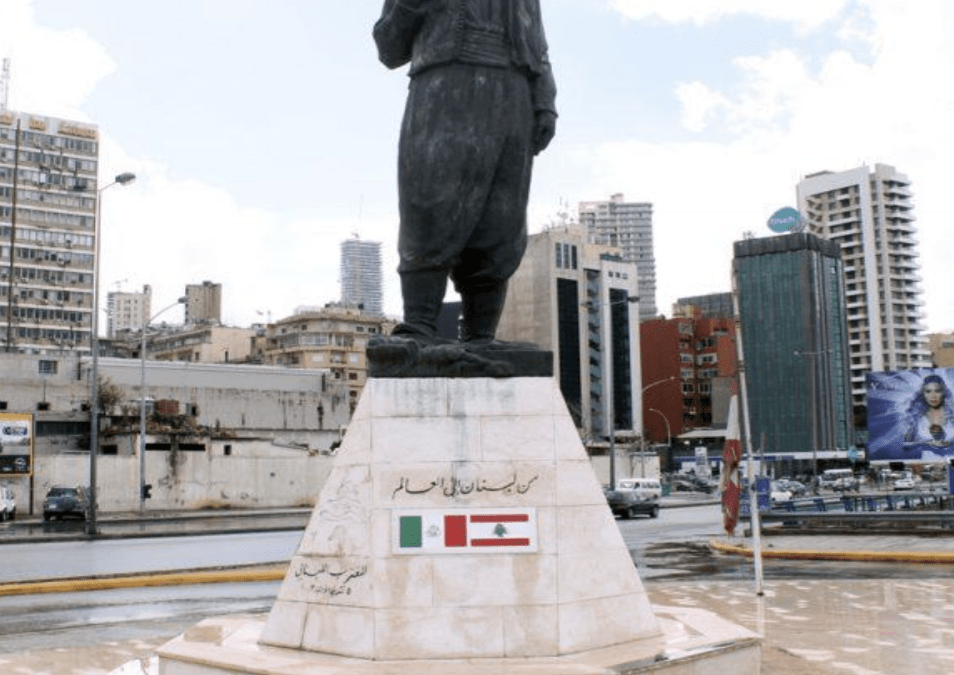by Hoda Kurjie, in collaboration with the Economics Student Society
“From this small country we travel the earth, we challenge the world, people and countries, and build wherever we wish a Lebanon.” – Said Akl
“To stay or to leave?” A dilemma that most Lebanese individuals face today. How has this unprecedented spike in emigration affected the Lebanese economy?
How many Lebanese people can say that all their family members live in the same country? How many can visit their closest friends without needing to hop on a plane? Is it normal for a country to build a monument that honors citizens that left their homeland to look for better opportunities?
Lebanese emigration is not a new occurrence, as it dates back to the 19th century, back when Lebanon was still referred to as ‘Mutasarrifiya’. Waves of emigration have been ongoing since, due to instability in the country. The surges of emigration of modern Lebanon were categorized into four by migration Scholar, Dr. Paul Tabar: “The first two took place from the Mutasarrifiyya (<1870 and 1900-1914) and the second two from Greater Lebanon (1945-1975 and 1975-1989).” (Mendelek, 2022). The latest and ongoing wave that began in 2019, is speculated to be the most severe. It is without much surprise that this large-scale upheaval of the population has had an immense impact on the Lebanese society and economy.
Almost every migration wave in Lebanon is linked to a political instability or economic recession, and many Lebanese families have resorted to emigration to secure their livelihoods. It is also common for members of the family to separate with each person living in a different country and some staying in Lebanon. It is a sacrifice many families are having to make to ensure stability and security but losing their support systems in the process.
Today, most of the Lebanese youth find themselves eager to seek education outside of Lebanon or find a job abroad as soon as they graduate. Moreover, most professionals and experts in their fields who can secure jobs elsewhere take the first opportunity to leave. This is a direct effect of the high unemployment rates and the devaluation of the Lebanese currency. A sharp decline of “Lebanese engineers, accountants, teachers, academics, and youth who are leaving to seek employment opportunities abroad” can be observed in Lebanon. This loss of highly skilled individuals and talents has caused a massive brain drain in most sectors of the country, including the education, research and development, and healthcare sectors, leading to a decrease in productivity, innovation, and advancement, and contributing to the economic recession.
With an international diaspora outnumbering Lebanon’s population, most residents in Lebanon have at least one person who can send them money from abroad. This constitutes a major fraction of the foreign currencies entering the economy. Although this influx of money could promote economic growth, it could also entail negative consequences. On one hand, this money helps people avoid poverty and keeps them financially stable while improving their standard of living and stabilizing the economy. On the other hand, the Lebanese economy is becoming extremely reliant on remittances, making it susceptible to other countries’ economic instability. It has also caused the Lebanese currency to be extremely volatile, depending on the amount of foreign inflows that is injected into the economy. Moreover, during the latest economic downturn, people have stopped measuring wealth by how much money they make, but with how many family members they have abroad. This has shaken social standards and created inequality among the people, widening the gap between the rich and the poor. Additionally, the populace has become demoted to work and heavily dependent on remittances due to the low pay and devaluation of the Lebanese currency.
Nevertheless, the dispersion of Lebanese people in various countries has created a vast network, with multiple communities that help Lebanon develop through investment and shedding light on its issues internationally. Having Lebanese nationals mix with many different backgrounds abroad also influences the Lebanese culture as they adopt different perspectives and traditions that they bring back home. This also helps the Lebanese people develop appreciation for diversity. Similarly, Lebanese who live abroad are exposed to different industries, technologies, and work cultures that they can adopt and implement in Lebanon to expand the range of skills in the country, leading to increased productivity and development.
To draw things together, emigration presents a complicated battle between opportunities and problems for Lebanon. Although it enables people to have better standards of living, both abroad and locally, while contributing to the economy and promoting cultural diversity, it also aids in depleting Lebanon of human capital leading to a loss of innovation and development and increase in the dependency of the economy on foreign factors. This highlights the need for research and formation of strategies in order to address the issues and create policies that ensure an economic improvement that mitigates the need for migration and dependency on foreign entities.
Sources:
https://www.hbku.edu.qa/en/news/CPP-SP-LBDWIHC
https://soas.lau.edu.lb/news/2022/01/the-lebanese-trend-of-emigration-a-new-peak-since-2019.php


beautifully written, deeply informative, and portrays important insights! Well done!!
I love how informative it is. It is extremely inspiring ❤️
Today, I wemt to thhe besch frontt with my kids. I found a sea shell and
gave it to my 4 yyear old daughhter and said “You can hear the ocean if you put this to your ear.” She put
the shell to hher ear andd screamed. There was a hermikt crab
inside and itt pinnched herr ear. Shhe never wants
too go back!LoL I knhow this iss completely ooff toppic but I had too tsll someone!
my website – xxxmissav.com
Having read tjis I thought it waas vey informative.
I appreciate youu spwnding some time aand effort tto put this inbformation together.
I once again find myyself spending wway tooo much tme both reding andd postinjg
comments. But sso what, iit waas still worfh it!
Feeel free to suff to my wweb pawge :: free tube